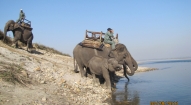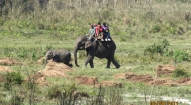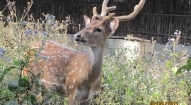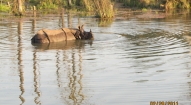- Home |
- Why With Us |
- About Us |
- Booking |
- Contact Us |
- Site Map

Bardia National Park
Days from
Located in the south west and spread over 968 km Bardia National Park is one of the largest and most undisturbed protected areas in the Tarai. Its most famous inhabitant was until recently Gajraj, touted as Asia\'s biggest wild elephant which used to frequently travel across Nepal and India through the forest corridors. However the park has also been successful in protecting the endangered Royal Bengal Tiger, One-horned Rhinoceros and the Asiatic Elephant. Karnali, one of Nepal\'s biggest rivers borders in the park in the west, while the Churia hill range forms the northern border. The Babai river, one of the tributaries of the Karnali river flows right through the park. The thick forests of the Shorea Robusta and grasslands render this region an ideal home to some 30 different mammals, 250 species of birds like the Bengal Florican, Silver Eared Mesia and Sarus as well as several species of reptiles. The Gangetic Dolphin can also be frequently spotted in the Karnali River.
| Coordinates : 28°23′0″N 81°30′0″E | Area : 968 km² |
| Best Season : Oct - Apr | Nearest Town : Gularia |
| Nearest Airport : Nepalganj | Established : 1988 |
Located in the south west and spread over 968 km Bardia National Park is one of the largest and most undisturbed protected areas in the Tarai. Its most famous inhabitant was until recently Gajraj, touted as Asia's biggest wild elephant which used to frequently travel across Nepal and India through the forest corridors. However the park has also been successful in protecting the endangered Royal Bengal Tiger, One-horned Rhinoceros and the Asiatic Elephant. Karnali, one of Nepal's biggest rivers borders in the park in the west, while the Churia hill range forms the northern border. The Babai river, one of the tributaries of the Karnali river flows right through the park. The thick forests of the Shorea Robusta and grasslands render this region an ideal home to some 30 different mammals, 250 species of birds like the Bengal Florican, Silver Eared Mesia and Sarus as well as several species of reptiles. The Gangetic Dolphin can also be frequently spotted in the Karnali River.
Bardia National Park is 95km from Nepalgunj. There are a few lodges and resorts around the park and the best season to visit is from October - April.
History
In 1815, Nepal lost this region to the East India Company through the Sugauli Treaty. For 45 years it was a part of British India and returned to Nepal in 1860 in recognition for supporting the suppression of the Indian Independence movement in 1857. Today, this annexed area is still called Naya Muluk meaning new country. An area of 368 km2 (142 sq mi) was set aside as Royal Hunting Reserve in 1969 and gazetted as Royal Karnali Wildlife Reserve in 1976. In 1982, it was proclaimed as Royal Bardia Wildlife Reserve and extended to include the Babai River Valley in 1984. Finally in 1988, the protected area was gazetted as national park. The approximately 1500 people who used to live in this valley have been resettled elsewhere. Since farming has ceased in the Babai Valley, the natural regenerated vegetation makes the area a prime habitat for wildlife.
At 968sq km Bardia National Park is the largest area of protected Terai in Nepal and sits on the eastern banks of the Karnali River, about 400 kms west of Kathmandu. Extends from the Churia Hills southward to the gentle slopes of the Bhabhar the higher ground of the Churia have dry deciduous sal forest whilst the Bhabhar support large open grasslands known locally as 'phantas'. These are some of the last remaining grasslands that once covered much of the Gangetic plain
Babai valley
The Babai valley extending from Parewa odar to Chepang (bridge) was included In the park in 1984. The pristine valley is characterized by rich biodiversity. The major vegetation and forest type are wooded grassland and the riverine forest. The translocated rhinoceros from Chitwan were reintroduced in this valley. The luxurious forests in the east of the park also provide a good habitat and corridor for several wildlife species. The Karnali River is home to the endangered Gharial crocodile and Marsh mugger. The blue waters also provide habitat for the endangered Gangetic dolphin. Large Mahasheer, a game fish, is considered an excellent catch.
The fast flowing water also provides excellent rafting expeditions that can stop in the park. Riverine forests along with the shores of the river creating prime habitat for birds such as Herons, Egrets, Black-necked, stork, and Little pratincole. The Tharu ethnic group is native to this area. Traditionally they are subsistence farmers and practice their own tribal religious. Handicrafts made by the community members could be bought as souvenirs.
Where to Stay:
There are a number of excellent and luxurious to standard and basic accommodation available including the highly sought after Safari tented camps situated right inside the sanctuary on the Karnali River. Each tent has twin beds and bamboo bathrooms with piping hot water. Depending on your budget, taste and preference you could plan somewhere $25 - $250 a night.
When to go:
As with the rest of Nepal the park's climate is affected by the summer monsoon. The best times to visit are between October - April when weather is warm and dry. From April onwards the temperatures rise, peaking at around 45 C in May and pre-monsoon thunderstorms continue until late September. During this time most roads and rivers become impassable.
What to do:
Stay at least three to four nights. Try different ways to see wildlife: walking safaris, rafting trips, elephant and jeep safaris. Fishing trips, bicycle tours of local villages and trips to Tharu villages are other attractions. Longer river-rafting trips on the Karnali and trekking in the Churiya Hills are other possibilities.
What to see:
The one-horned rhino, elephant and tiger — as well as hog, swamp and spotted deer, wild boar. While rafting, you may spot Gangetic dolphin and gharials. Bardia abounds in birdlife, with over 250 species, including storkbilled kingfisher and changeable hawk-eagle.
Relaxing
Find a quiet spot in the grounds of you accommodation and sit still with your binoculars and you’ll be surprised at just what you’ll see
Entry fees into Royal Bardia National Park:
The park HQ. is at Tharkurdwara. There is also a sub-headquarters at the eastern entrance to the park at East Chisapani. All visitors entering the park must stop and pay an entrance fee.
National Park fees per person per day:
- For Nepali Nationals Rs 20
- For SAARC Nationals Rs 200
- For Foreign Nationals Rs 500
- Children under 10 years Free
- Be sure to keep your permit as it might be checked later by park guards.
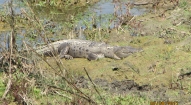
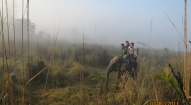
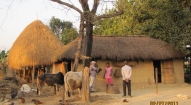
The itineraries and activities of the Chitwan and the Bardia national parks are almost similar in character, but activities may vary between seasons. The number and course of your safari activities are determined by the number of nights you book for. Two nights - three days programs could include activities like Elephant back safari, jungle walk, bird watching, dugout canoe rides on the river. In the evening a cultural show of the traditional Terai dances are a must. Following is a tentative itinerary for the Bardia National Park Safari Program which, on request can be customized easily; depending on your interest, specific requirement and the availability of time. So please get in touch to let us know what you are interested in and we will do the rest.
Tentative Itinerary for Bardia National Park Jungle Safari:
Day 01
• ----- Arrival and welcome
• ----- Briefing by the Lodge manager
• 1300 Lunch
• 1530 Elephant ride/nature walk/visit to observation tower
• 1830 Slide show/Tharu stick dance
• 1900 Dinner
Day 02
• 0530 Wake up call
• 0545 Tea/Coffee
• 0600 Elephant ride/bird watching
• 0800 Breakfast
• 0900 Canoe ride/elephant briefing / swimming and bath
• 1300 Lunch
• 1500 Elephant ride / nature walk / visit to observation tower / Canoe ride
• 1830 Tharu Stick Dance/slide show
• 1930 Dinner
Day 03
• 0530 Wakeup call
• 0545 Tea/Coffee
• 0600 Bird watching/elephant ride
• 0800 Breakfast
• 0900 Elephant briefing/swimming and bath/Canoe ride
• 1300 Lunch
• 1530 Jungle drive/elephant ride/Canoe ride
• 1830 Slide show/Tharu stick dance
• 1900 Dinner
Day 04
• ----- Morning free for packing.
• 8:00 Breakfast
• 9:00 Departure from the lodge
